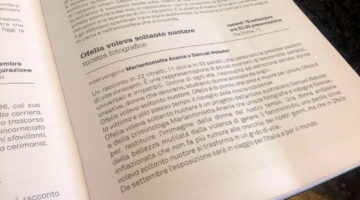 I’ve been in Italy for a total of nine months now.
I’ve been in Italy for a total of nine months now.
I’m pleased to say that I speak far more Italian now, but one thing still strikes me regularly. In polite company, ‘scusa per il mio Italiano’ is always met with ‘no, scusa per il mio Inglese.’ In fact, I discovered quite quickly that as timid as I was about my Italian, Italians were equally shy. Sometimes they would be fluent, and still apologise in advance. My answer remains the same: “ma dai, siamo in Toscana, quando siamo in Australia, ci parliamo in Inglese.”
But the pressure remains. With English spoken all over the world, and Italian spoken only in Italy (or by Italians abroad), there is this perception that not speaking English is a sign of something, perhaps a lack of education or an absence of world travel. In my experience, those who speak English usually have a reason to do so, and those who don’t, simply do not.
You can try to break it down into education, but students these days learn English from a very young age, and speaking English is not necessarily a simple signifier of intelligence. Rather, it seems to me a desire to connect with something to which English is a gateway.
From my perspective, those who do not need to speak English for their work share one thing in common: cultural fascination. English provides a doorway through which Italians might understand a great body of work beyond their fair shores. It would be ignorant to say that, culturally, this is a necessary body of work and it is easily argued that the thousands of years of Italian art and history is far more necessary than that created in the US over the last 400 years. However, those who speak English are usually more interested in English-speaking culture at some level than those who have let their knowledge of the language slip. Whether reading classic English/American literature as a comparison to Italian literature, or enjoying American pop music, there is some need to connect to that world.
Just as it would be naïve to generalise all English speakers in this way, it would be equally so to assume that non-English speakers are in any way uncultured. The Italian landscape is so incredibly rich in heritage and cultural artefact that I can’t imagine ever feeling limited, and personal history is far more lucrative a resource than those found across the seas.
But still, I hear of the necessity of English, and for economic purposes that may well be true, but I would argue that culturally, there are pitfalls to opening the cultural door between the English speaking world, in particular the USA, and Italy. Already, the younger generation of Italians seem less interested in the traditional food of their heritage, the songs that were sung over the generations, or the art that lines their streets. Tourism has well and truly made its mark on the large cities and leaves few passageways for a life untouched by fleeting foreign hands. Opening the door to global pop culture at a time of economic crisis, with Berlusconi controlling entertainment, is a culturally dangerous move.
In Australia, as television was adopted on a large scale, laws were introduced for all free-to-air providers (that is, commercial TV stations without subscription fees) to maintain a percentage of “home-grown” content. At a time when it was easier to purchase a season of television than it was to make one, it was a necessity to protect the artistic occupations in the country. As I write this, the percentage required under the ACMA guidelines is 55%, broadcast between 6am and midnight and the networks regularly exceed this.
Economically, however, the threat remains: it is cheaper to purchase a season of The Simpsons than it is to create one episode of an Australian equivalent. Hollywood, simply put, has the soundstages and the industry that Australia does not. Today, commercial stations use a loophole to bypass the original content law. News hours get included, current affairs programs and morning shows too. If you can run four hours of ‘Australian content’ in the morning and create it very cheaply, you have ‘done your duty’ legally. This is why every commercial channel has a morning show full of interviews and low-budget production values – if you’re lucky, a soap opera with repetitive sets and salary-paid actors. They may be creating Australian content, but these programs are far less valuable to the Australian arts industry than fresh, high-end production.
In Italy, we can already see the hand of Berlusconi on popular culture. Game shows centered on attractive women. Interview shows providing endless commentary. This, too, is cheap to make and appeals to the lowest common denominator. It does little for art, but it does provide entertainment.
If the majority of the country spoke English, there would certainly be a benefit in terms of entertainment – hit shows would be released here far more quickly, without the horrendous overdubbing – but there is great potential for local art to suffer. Incredible American dramas like Breaking Bad, Homeland and House of Cards would soon see a change in television viewership. Movie cinemas would show original language films immediately.
However, Italian entertainers would find themselves competing. Italian films would, as Australian films do now, struggle to compete with the budget of American films and compete for the audience. American products may soon litter the streets, as they do in Australia, and Italian language music would become marginalised, as Australian music is now. Potentially, the food would remain the same, but the value system would change. There are discotheques here in Italy, but Rome does not yet have the club culture of New York. There are cinemas here, but the museums are always full.
Now, obviously Australia and Italy have different histories. Post-colonial Australia has always spoken English, but I think the point remains – no matter how you get there, if you open yourself up to the importation of mass culture, you put your heritage at risk. If you do not remain devoted to the preservation of that heritage, over the coming decades it may begin to slip away.
We worry every day about losing our tradition, about adopting new ways which are shallow versions of the old, but rarely are we on the precipice of major cultural foresight. In 50 years, the oceans will have risen, and time will have taken Venice underwater. I just hope it doesn’t take the rest of Italy with it.
Do you agree? Is it necessary to speak English in the 21st century?





Wow, great ending. Funny how reading this reminded me of people and companies going 'green'. For the most part it all ties to money. Money money money. Companies use endless amount of plastic bags because they are cheap, if each plastic bag was to cost more, companies would not fit it in their budget anymore.
I love the comparison to Australian arts. That point really shows how vital national arts are. I say this because it must be so easy for english speaking countries to just purchase and reuse american tv/movies/products. Ah, but the Australians did well in fighting to somehow not let themselves become dependant and slowly morph into a version of the States. I guess based on what you said, they can still do better though… higher quality productions.
It is sad to have Italians say 'oh excuse my english' when we are in Italy! I mean, I would never apologize for my italian if I were living in America. American is so central to many many things, and now especially since everything is web based. Design is still strong abroad, but Americans seem to get how to use social media so much better than other countries. I have seen non-english speakers posting some ridiculous copy on social sites making them seem like they have no clue as to how to appropriately engage with others.
Hm, it must be the culture! Americans tend to be more open and chill and not as sell sell sell compared to people I've seen on social sites who spam the heck out of others. It seems as though they don't know the rules of engagement…. sorry, I am going off a bit on this, but it is what I see every day and has become quite irritating.
As I write this, it is clicking that they do what they do based on culture, it is what they know and how they interact. Americans interact very differently. We are famous for being more open and expressing ourselves. This social media phenomenon is probably not ideal for cultures who seem more closed off and private although people as a whole crave to be heard and crave to share. If you are from a closed culture it may take a while to understand global social 'norms' that they never had to confront before.
The longer I stay in Florence, the more I see how oddly different we all are, but with the same goals in life. We all get there differently, but hope to reach the same destination (love, family, friends, health).
Well, I didn't expect to write a post within your post. lol. Keep writing Sam, bravo.
A well-written, well-thought article-I think that you describe very well how Italians feel about not speaking English. I am also interested in understanding why they DON'T speak English, when I see that they have adopted other American or English habits or ways…
I think a lot of it has to do with dubbing, to be honest. You can listen to American pop music all day without understanding the words, but if television programs and movies weren't dubbed into Italian, you'd have a lot more Italians learning to be a part of that world. But, like I said before, that could be a dangerous path for Italian culture.